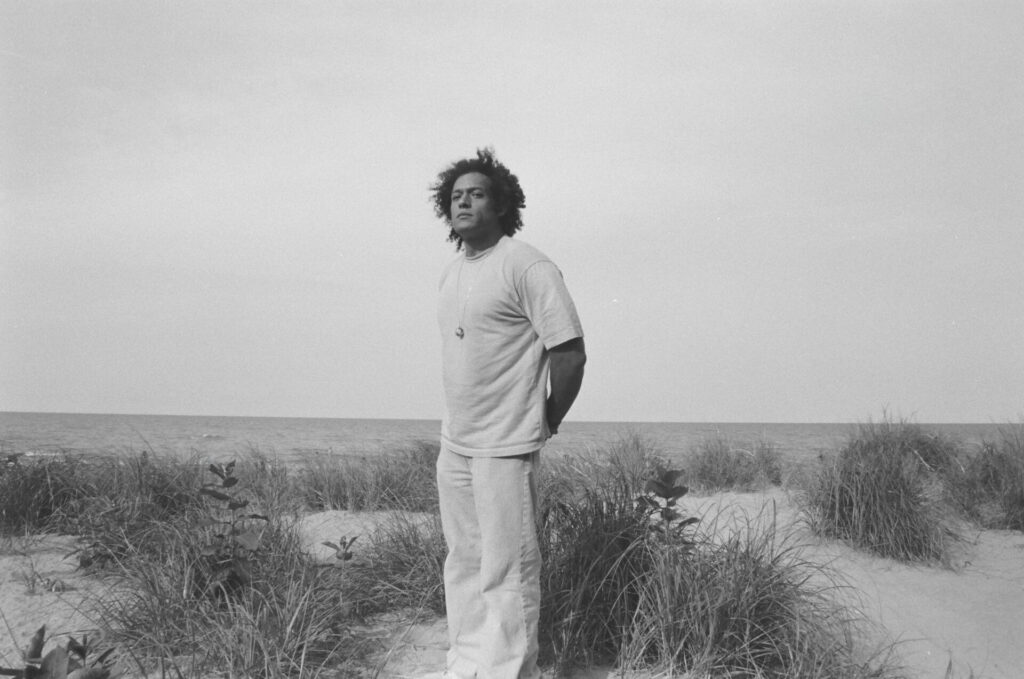“Improvisation is messy. Life is complicated.” Speaking over Zoom from his home in Chicago, drummer/ composer/ producer Makaya McCraven is getting philosophical. “Life is going to give us surprises, twists and turns. You can’t predict everything. The unexpected is around the corner, and we are improvising through the unknown, barrelling through the universe at all times… and you sharpen your skills to live the best and most productive and happiest life that you can for you and those around you. To me, that is improvising. I mean in a really literal sense that we are improvising all moments, at all times.”
Since the release of his breakthrough album, In The Moment, in 2015, McCraven has honed a vibrant and vital approach to music with improvisation at its heart. Recordings of spontaneous group compositions performed live in front of an audience are the starting point. McCraven then takes these improvisations into the studio and uses them as building blocks for crafting concise, beat-driven compositions that meld jazz, hip hop and electronica. It’s a modus operandi that echoes producer Teo Macero’s groundbreaking work sculpting Miles Davis’s lengthy jams into coherent albums between In A Silent Way (1969) and Get Up With It (1974). Call it capturing lightning in a bottle.
That approach is very much in evidence on four brand new digital EPs, released simultaneously at the end of this month, to be collated on a forthcoming double album, Off The Record. Each of the four releases is drawn from live performances with McCraven collaborating with some heavyweight associates. The People’s Mixtape features bassist Junius Paul, trumpeter Marquis Hill, vibraphonist Joel Ross and synthesist Jeremiah Chiu. Hidden Out! has Paul again, with guitarist Jeff Parker and alto saxophonist Josh Johnson. PopUp Shop convenes Parker with vibraphonist Justin “Justefan” Thomas and bassist Benjamin J. Shepherd. And Techno Logic draws together cornetist/ vocalist Ben LaMar Gay and British tuba player Theon Cross, with McCraven overdubbing keyboard, bass and vibraphone.
On the first three of these, crisp guitar lines, plangent trumpet statements and mellifluous vibes combine with preposterously deep boom bap rhythms to create an organic fusion of jazz and hip hop. It’s a balancing act that artists have been trying to pull off since the late 80s, with varying degrees of success. Guru’s series of Jazzamatazz albums came close to getting it right, beginning with 1993’s Vol.1, which layered contributions from storied jazz players including trumpeter Donald Byrd and vibraphonist Roy Ayers over the rapper’s louche bars. But even that felt like two different languages not quite finding a common dialect. From the other direction, Miles Davis’s decidedly patchy Doo-Bop, released posthumously in 1992, the year after his death, failed to ignite, despite enlisting the talents of hip hop producer Easy Mo Bee.
Alongside the work of Madlib, McCraven’s constructions feel like the sleekest and most convincing synthesis of the two schools to date. “The thing that drew me into hip hop, into the production side, was sampling,” he explains. “It was the thing that really piqued my interest and fascination with different types of recording techniques and how different music was being made. That’s influenced my approach a lot.” In the process, McCraven’s sound proposes a radical reimagining of what jazz can be in the 21st century. For McCraven, it’s a result of “liking to shake things up and feeling like that is part of the legacy of jazz in broader terms. It’s a provocative music and music of the people. Music of a free spirit, of innovation, both in where music can go as well as innovation in blending different styles of music. Even early jazz [was] an innovation of new technologies. The drum set really is an impetus of all modern music, with the kick, snare and high hats still existing in electronic music.”
The EP Techno Logic contains one of McCraven’s most arresting hip hop/ jazz hybrids – the boldly named ‘Boom Bapped’, which lays down a crunching groove with Ben LaMar Gay’s cornet spitting neat lines and McCraven adding warm Fender Rhodes chords. But, of the four new digital releases, Techno Logic is also the one that moves furthest away from the hip hop/ jazz template. With source material drawn from three live performances over an eight-year period – London in 2017, Berlin in 2024 and New York earlier this year – it’s the most brazenly ‘out’ of McCraven’s fresh joints, revealing a trio developing an entirely new approach. Much of its unfamiliarity stems from the opulent squelch of Theon Cross’s hurtling tuba basslines, which sound more like a mutant strain of acid house than jazz. “That trio has been able to get together sporadically,” says McCraven, “but every time, it’s been kind of fun and wild, and I documented a couple of those. I went digging through the materials and was really excited about some of the sounds and I like that kind of out-there energy.”

On the opening track, ‘Gnu Blu’, the beat suddenly drops away, with Cross sending out lurching, electronically manipulated tuba spurts and squirts. Burbling robotic bleeps arise in a thick stew, segueing into the next track, ‘Technology’, as a stumbling groove locks in and Ben LaMar Gay declaims, “feel that in your body, it’s called technology!” It’s a dizzying mash up of rough noise aggression, dance energy and poetry slam call to action. And it’s a direction McCraven hopes to pursue further. “We have some ideas of doing some stuff in the future and a little bit more of a roadmap for a repertoire for this group of musicians that we never had before, that collectively we’ve created for ourselves using everybody’s input in the moment and me shaping that afterwards.”
It’s clear that McCraven is having fun creating music that he says, “only exists in a virtual world or a dream state, which is the recorded world.” But the original live performances always provide the bright, unpredictable ignition for all his alchemical transformations. “You can add whatever in the studio or compose with bits and pieces of the improvisation,” he explains. “But what I can’t do in the studio is add inspiration to a performance that we captured. Capturing some inspired moments or something that happened that feels real or unique to me is the golden element in this process. That is the thing.”
It’s kind of inevitable that McCraven would end up making radical music. His mother is Hungarian singer and flautist Ágnes Zsigmondi and his father is Stephen McCraven, a jazz drummer who has worked extensively with the likes of saxophonist Marion Brown, multi-instrumentalist Yusef Lateef and, most notably, for many years with saxophonist and arch avant-gardist, Archie Shepp. Born in Paris in 1983, McCraven was raised in the Northampton, Massachusetts area, in a creative environment where Shepp and others were regular house guests.
By the early 2000s, he had co-founded what he calls a “live hip hop band” – Cold Duck Complex – and was studying music at University of Massachusetts Amherst. But his formal education turned out to be a disappointing and stifling experience. “In the academic space I felt a really narrow concept of jazz compared to what I grew up around and my mentors,” he recalls. “I had come up seeing Archie Shepp and my dad playing outside of the mainstream jazz market and I had a different perspective from there. Archie Shepp was very outspoken, very eloquent on race and the history of this music. I would go to jazz school and there would be no space necessarily for a real discussion about race, but we’d learn the music and have to wear a suit and stuff, missing even how radical straight-ahead jazz was in its day.”
But a move to Chicago in 2006 unlocked the new horizons he was looking for, bringing him into contact with other searchers including Jeff Parker and Marquis Hill. “I immediately met young musicians and a scene that was engaged in that [radical sensibility] with the AACM [Association for the Advancement of Creative Musicians] and Art Ensemble [of Chicago]. To me, it’s an inherent part of the music.”
For McCraven, tradition is important, and throughout his career he’s consistently engaged with the history of the music. His 2020 album, We’re New Again: A Reimagining by Makaya McCraven remixed the final album by one of the original godfathers of jazz hip hop, Gil Scott-Heron’s I’m New Here. (On this album he also sampled his father’s deep-jazz album, Wooley The Newt – originally released in 1979 and getting a long overdue vinyl reissue this November.) And, in 2021, he released Deciphering The Message, on which he enlisted Parker, Hill and others to help him dig into the Blue Note back catalogue and put a modern spin on classic tunes by mid-20th century jazz originators including Art Blakey, Horace Silver and Hank Mobley.
It’s not hard to position McCraven in a continuum that extends from those radical Black musicians and thinkers – artists who were explicitly addressing crucial socio-cultural issues such as the Civil Rights and Black Power movements, and who were working with jazz as a consciousness-raising energy. “I think of music as a really powerful force that’s beyond genre in any way,” he clarifies. “[It’s] about what you’re putting out to the world and what purposes music and art serve in our lives and society as an essential element of life. Music can be just entertainment, but it also has so much meaning. It could accompany your most important moments from weddings to funerals, but then also the social impact and how we engage with the tenor of a moment, and how people identify themselves, even. So, to me, improvising and playing jazz is a representation or metaphor for life. It’s having the skills to navigate form but still improvise and still be yourself. I strive for those things and look at the musicians before me as a light for what that looks like.”
For an artist attuned to music’s ability to comment on the cultural moment, these are worrying and uncertain times, in the US and around the world – not least because of the alienating and radicalising effects of social media. “It’s great how we can stay connected and communicate and everybody has some platform for their voice,” says McCraven. “But I think when we’re all yelling in the public square and everybody’s amplified, it becomes overwhelming. It’s deafening and blinding and when we’re looking at each other through screens, people lose their humanity with each other. This space, which is the culture of everybody beating their chest, I think has been not taking us in a positive direction.”
It’s unavoidable, then, that McCraven’s music will reflect these times. He is, he says, “responding to the feelings of things around me and the environment and how that makes you think about what you want to do and put out into the world.” For him, that means fighting the bullshit with deliberate positivity. “I have to keep on moving forward and it’s not a time to just sit back. It’s time to activate, and truck forward with whatever you can do to be a positive antithesis to the turmoil.”
And, in the end, it all comes back to that live, shared experience. “I think that people are feeling a lack of beauty, beautiful moments, connection, little simple things. And it doesn’t have to be music. I think if you put 50 people in a room and have them stand silently for a second, you might feel something.”
“One big theme of this new record for me has been real life,” he continues. “You come into the venues and these spaces and create something magical that happens between human beings. It doesn’t need to be perfect. It doesn’t need to be polished. But we had an experience in this space. It’s freeing, it’s spiritual, whatever you want to call it. Imperfect. The idea is like, meet us here in real life. You want to be part of this experience, have connections with your neighbour. And let’s turn off the propaganda machine every so often.”
Makaya McCraven releases four new records simultaneously on Halloween via International Anthem





